Hi everybody,
My name is Marilyne, I am 30 years old, I come from France and I am a European volunteer in Lefkada at Solidarity Tracks organization for one year. From now I will work on the redaction of Green O’clock online magazine. The first topic with what I will start it’s the exchange and the preservation of seeds. This subject is a very current and important topic for our future that is why I choose it. We have to take care and protect the nature which surround us. By making my researches, I found some articles about Peliti Organisation, which raised up my interest more and I decided to contact them to receive more information about their work. Thank to our Orange Radionet team who broadcasted an emission as well on this topic, I get in contact with Costas Tsigou, a farmer, who is an active member of Peliti Organization in Peratia (7 km from Lefkada) and he lives there since 1997. Presentation of Peliti Organisation
Peliti is an NGO founded by Panagiotis Sainatoudis in 1995. This organization has born under his personal necessity and with the idea of development. He named the organization Peliti which means “oak tree”. The main objectives of Peliti Organization are:
- Collection, preservation and dissemination of local varieties and breeds of indigenous cattle
- Exchange of goods and services without money like seeds
- Creation of an alternative community centred in the conservation of local varieties.
The headquarters is situated in Messochori Paranestiou and currently has 12 local groups in different parts of the country. They collaborate with groups from other countries, including Austria and Turkey, and with the Greek National Seed Bank in Thessaloniki as well. Volunteers from all over the world can come to work and learn at the Peliti centre. From 1995, when the Pelliti association journey began more than 2.000 varieties of vegetables and grains were distributed by more than 120.000 professional and amateur farmers. After a general estimation we get the result that annually more than 20.000 bags of seed are distributed for free by Peliti. Nowadays the organization is working on the development of 3 main activities:
- Festival for Exchange Local Varieties
- Publication, communication
- Seed Bank
Meeting with Costas Tsigos
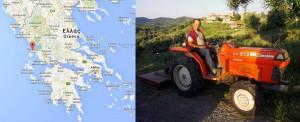 Costas Tsigos, farmer in Peratia
Costas Tsigos, farmer in Peratia
Costas Tsigos is an active member of the local group of Peratia village. Our meeting took place in the garden of the organization in Peratia on 24th of May on a sunny Saturday.
Marilyne: Costas why did you choose the organic agriculture?
Costas Tsigos: I come from the countryside close to Athens (20km). My parents and grandparents were farmers but they were practicing conventional farming. They used to use chemical products in their garden against parasite. They know as well the traditional and non-chemical way of growing vegetables and fruits so they teach me the way how to collect and conserve the seeds and do traditional farming. I decided to become an organic farmer to be in harmony with the nature and I set my main goal which is to be self-efficient in feeding my family. In Greece to be an organic food producer is not easy, the government doesn`t help us much, but we are trying our best. I can say that I succeed, I have my own farm with a surface of 2 ha where I am producing vegetables and vegetables which are on the way of disappearance, olive oil, leguminous plants, eggs etc. 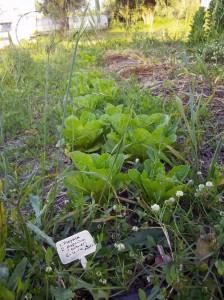 M: Why did you decide to join Peliti organization? C: I joined Peliti organisation because of the network of people with whom I can share same ideas of the organic agriculture. In this group I am feeling like a real family member. Thanks to the spirit: we are speaking the same language! Our philosophy is based on the non-conventional agriculture which means without use of any chemical products. Through this organization we are encouraging the concept of self-efficiency and the protection of the vegetables’ varieties. M: Could you tell me more about your local group action? C: So now, I am an active member of the local group in Peratia. Our office is situated in a local school, where our regularly meetings takes place.
M: Why did you decide to join Peliti organization? C: I joined Peliti organisation because of the network of people with whom I can share same ideas of the organic agriculture. In this group I am feeling like a real family member. Thanks to the spirit: we are speaking the same language! Our philosophy is based on the non-conventional agriculture which means without use of any chemical products. Through this organization we are encouraging the concept of self-efficiency and the protection of the vegetables’ varieties. M: Could you tell me more about your local group action? C: So now, I am an active member of the local group in Peratia. Our office is situated in a local school, where our regularly meetings takes place.
Lettuce Plant
- We set up 7 main actions:
– Creation of a garden where the idea is to product and conserve seeds. This garden is opened for everyone, anybody can come to learn and help to plant seeds and to take as well. The garden has a pedagogical purpose as well, for this reason schools are invited regularly to take part in their activities (gardening training for adults and youth).The goal of this garden is the production of seeds. – Workshop every Saturday afternoon like how to collect seeds… – Information activities hold in school: inform children about seeds, GMO, ecology, organic etc. … and to involve them. – Manage various actions about bio-diversity. – Seed bank: we have our own seed bank with around 20 different types and varieties of vegetables (ex. 4 varieties of tomatoes, 2 varieties of zucchini, etc. …)- Organize seminaries about permaculture, seeds… – Exchange of seeds without money on different events and festivals.
Method of seeds collecting
M: When the collection and the exchanges of seeds are organized? C: Every year we are collecting the seeds form May until September. So we can start to exchange the seeds from September till April. Once per year the local group of Peratia organize a day of seeds exchange without money. This year it took place in Peratia school in 13th of April. In the rest of the year we try to have permanent stand in order to promote our organization and the events.
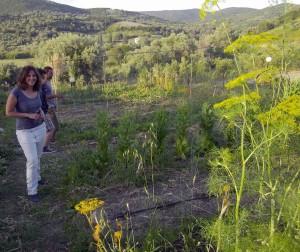
Costas’ Garden
If you want more information about the exchange on the April 13th in Peratia, you are more than welcome to listen our orange radio emission broadcasted by Francesco. (http://www.spreaker.com/user/orangeradionet/local-seeds-exchange-peratia-13-04-14?sp_redirected=true#_=_)
By Marilyne for Green O’Clock Greece

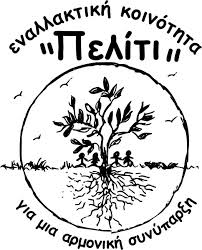
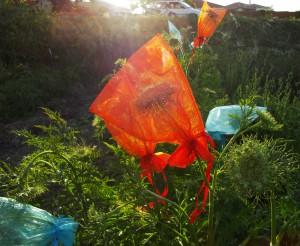
Very interesting !
I like this !
Thank you Marilyne to show us that organic agriculture already exists in Greece.
It’s very important to save the seeds.